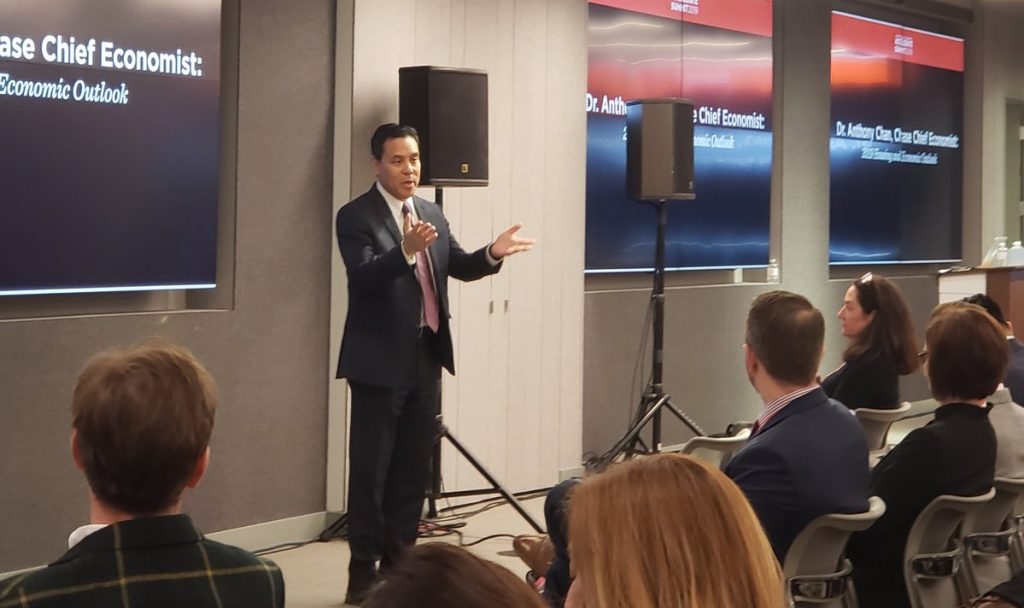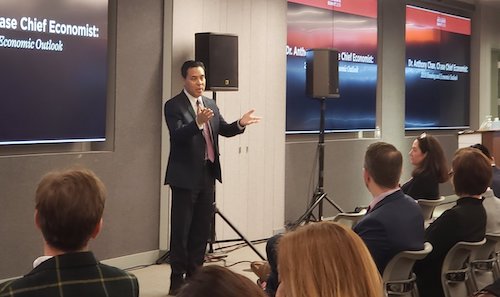American homeowners have a vested interest in the U.S. economy, and by association, so do real estate agents. The size and scope of the housing market, itself just one piece of the world’s largest economy, makes this a difficult subject to understand. But according to Dr. Anthony Chan, chief economist at J.P. Morgan Chase, we may be missing the forest for the trees. Speaking to attendees of Chicago Agent magazine’s Accelerate Summit March 5, Chan expressed confidence in the unique economic engine that is the Chicagoland market, as well as the steady growth prospects of the overall economy, despite the doom and gloom pervading recent headlines.
“Tell your clients to look at the indicators, even the common ones, like unemployment,” Chan said, referring to the record-low level of joblessness that is fueling a nearly 10-year-old economic expansion. “When you meet your clients, tell them you feel really comfortable, because the odds of seeing a recession in the next year aren’t any higher than average.”
Formerly an economist at the Federal Reserve Bank of New York as well as in Washington, D.C., Chan makes a point of comparing and combining as much economic data as possible on a daily basis to get a read on where things are headed. Engaging and quick-witted, he joked that as soon as he wakes up every day, “before I even say good morning to my wife, I check the 10-year Treasury yield.”
In seriousness, like many market-watchers, Chan has paid close attention to the yield curve, or the difference between short- and long-term interest rates paid on U.S. Treasury bills, often used as a broad economic barometer. Recently, the yield curve has come close to “inversion,” meaning investors are betting on slower growth in the future. The yield curve came close to inverting in the third quarter of 2018, stoking panic across financial markets.
However, Chan argued, the yield curve doesn’t tell the whole story. Looking at other broad economic indicators, including The Conference Board’s all-encompassing Leading Economic Index, chances of something approaching a recession are not strong. Chan projects the U.S. economy will post an average growth rate of 2 percent in 2019, after almost hitting 3 percent last year.
Chan: Chicago’s agents have an advantage
The story of Chicago’s housing market mirrors that of the overall U.S. economy, despite being something of an outlier compared to the residential markets in other large cities. Chan pointed out that while home price growth and sales activity in Chicago hasn’t matched that of hot markets like Las Vegas or Phoenix, it hasn’t been in decline. Home prices rose 3 percent over the last year, putting Chicago close to, but not beyond, its peak price level seen prior to the recession.
While that may not seem like cause for celebration, Chan noted that Chicago homeowners didn’t suffer as much from the 2008 housing crisis relative to other parts of the U.S.
“Prices didn’t drop as much in Chicago, but they’re not going up as much, either,” Chan said. “It’s a sign that [Chicago’s] economy is somewhat steady. For people who don’t like a lot of risk and don’t like a lot of volatility,” these are optimal conditions.
“You might say, ‘how could that be a strong selling point?’ Very simple. You tell them they’re getting a great deal,” Chan said to the audience of real estate professionals. “Chicago’s got a vibrant economy that’s continuing to grow, we have an unemployment rate below the national average, and yet you still can get a great deal on a house.”

